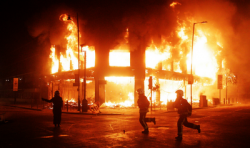Found at Libcom.org, Ari makes a good review of why, even if we may agree with some elements of the officialist discourse on the riots (which are surely "juvenile, destructive, unreasonable, and naive"), we really have nothing to talk with them anyhow.
Some excerpts:
The riots are indeed not political, existing politics is useless for most people
To say, then, that these riots and this looting are "not political" is to understand something very key indeed. Namely, that politics as it heretofore stands has shown itself, for many years and more clearly than ever, to be utterly inadequate in addressing the concerns and needs of those who barely fall beneath its shadow to start.
...Riots are the other side of democracy, when democracy means the capacity and legitimacy to vote into place measures that directly wound the very population they purport to represent.
Looting is the other side of credit, when credit entails the desperate scrambling of states and institutions to preserve a good line, cost to those who might borrow that credit be damned.
Not fair
It is brutal that people need to defend their stores with baseball bats, in fear of losing them.
It is brutal that people have to spend their lives working in those stores, in fear of losing them.
None of these are mutually exclusive. They are all true.
Bertolt Brecht would have understood it that way indeed.
But the Camerons of this day would let us believe that the latter is "fair", "fair play" and "free market" and even "freedom itself" - and what not.

Just excellent. Looking forward part II.
ReplyDeleteMaju, tell me if you find a spanish translation. I want to share it with some friends here in Brazil and in Spain (too lazy and limited to do it myself).
"Looking forward part II".
ReplyDeleteMe too.
"Maju, tell me if you find a spanish translation".
I'm not aware of it. I could try to translate but I'm also too lazy... ;)
The political stage has no duty to provide jobs for the unemployed, for it has the onus of a watch keeper. It is a mistake to pre-suppose that the millions of people elect the government to directly maintain job opportunities or job security for the needy. Although the government does create numerous jobs to build and maintain infrastructure it does not create immense employment opportunity for millions of its citizen, it’s the local businesses and independent corporations.
ReplyDeleteHow does one explain sport riots? (i.e. the recent Vancouver riots in Canada over the Stanley cup) riots that are not sparked by any social injustice, like the death of the black man in UK. Is there not more to economics, politics and other social realities in explaining this raging behavior of a mob? Is it not imperative to dissect into the individuals directly rioting or looting along with the crowd, for they all may have different motivations? The intellectual may reply it’s impossible and then a pragmatic soul may reply why should I take these, above mentioned explanations to be adequate?
That's the only reason a government exists from the viewpoint, not of a minority class, but of most society. Remember that all adults are voters, citizens, and not anymore just a few privileged ones.
ReplyDeleteWhat you describe so crudely, AJ, is the dictatorship of Capitalism, where a government exists only and primarily to guarantee property and nothing else. Such a government, such a constitution, such a state is worthless for the majority of the people.
Most people imagine the government not as a mere defender of the privileged elites but of all the people equally. And that is what the theory says: that the state is the functional manifestation of society as a whole. As such it must guarantee social well being one way or another. If it cannot create jobs, force their division and if it cannot then at least redistribute gains in form of welfare.
That is why this is part of the class war.
The Vancouver riots don't seem like being related: they were an instance of extreme hooliganism, right?
I do not think they compare: here the trigger was police abuse across class and race lines: a police murder of a Black working class man and the disdain of authorities for the pleas of an investigation. That could well trigger a full fledged revolution in other better circumstances really. Initially society was even sympathetic to rioters and looters and only as more and more cases of apparent abuse (the mugging of the Malaysian student or the attacks on "commoner" shops) showed up, the public opinion changed.
And it's indeed impractical to dissect each "soul". We are better off studying the phenomenon as meteorologists do and not molecule by molecule as you suggest rather happily. That last task belongs to gods and judges and it's horribly boring and ultimately unfair.